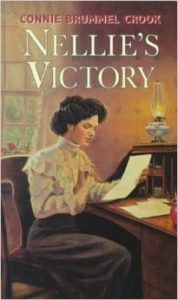For awards, reviews, excerpts and other information please scroll down.

Publisher: Toronto: Stoddart Kids Publishing, 1999.
Cover Art: David Craig
Summary: The third in the Nellie McClung trilogy, where Nellie helps women win the vote. She is also a best-selling author, and a devoted wife, and mother of five children.
AWARDS
I.O.D.E. – Violet Downey Book Award shortlist, 2000.
REVIEWS
Nellie accomplished much in the fight for women’s rights. She is a Canadian heroine and this book helped me learn more about her.
— Meredith Johnson UE (aged 11), The Loyalist Gazette
Women are persons too: In praise of Nellie McClung
Author Connie Brummel Crook has brought feminist Nellie McClung back to life just in time to celebrate the 70th anniversary of the advocate’s greatest accomplishment.
— Lois Tuffin, Peterborough This Week
EXCERPTS
Nellie’s Victory
Part One: Beginnings
Part Two: The Battle
Chapter One
“Nellie! How can you just sit there writing?”
Nellie looked up from her cluttered desk and brushed a lock of dark brown hair from her forehead.
“It’s the only time I have to write, Mother,” she said, turning back to the page in front of her.
“No, Nellie, it’s the only time you have to do your morning chores.” Mrs. Mooney put her hands on her hips and glared at her daughter. “I always said you’d never make a good wife and mother.”
“But,” Nellie answered absently, scratching her right temple with the end of the pencil, “I always write a bit in the morning before the children get up.” She stared at her mother then reached for a freshly sharpened pencil. “I love my writing and it does no one any harm.”
“That’s where you’re mistaken! The children are up, and they need you. Jack is trailing around the upstairs hall in his nightshirt, and Florence is screaming to get out of the crib. The only one I didn’t hear is the dear baby.”
“Oh, Paul’s right here,” said Nellie, pointing to the two month old tucked into the cradle on the other side of the desk. As she pointed, she brushed the desktop with her arm, smudging her white muslin sleeve with lead and wood shavings.
Nellie does, in fact, learn to juggle her many duties as a wife, mother, writer, and activist for women’s rights. She becomes a great orator for Women’s Rights and one of the few speakers who could fill Massey Hall in Toronto. An adapted excerpt from her autobiography The Stream Runs Fast tells about an incident where she and her friend Mrs. Nash visit a basement factory with Rodmond Roblin, the Premier of Manitoba, in an effort to convince him to do something about poor working conditions for women in Winnipeg.
“Please come this way, sir,” Mrs. Nash shouted, directing them with her arm. Nellie and the premier followed.
Nellie thought she heard him say, “Thank goodness,” as he turned away from the workers. Mrs. Nash however, was not leading him outside, but through a side door that opened into a short, narrow hallway. An even worse smell hit them there. Nevertheless, Nellie closed the door behind her, and when the premier turned around to go back, Nellie gave him a gentle push ahead.
“You can’t miss this sight,” Nellie said, knowing full well what was ahead, for Mrs. Nash had told her about it.
Sir Rodmond turned and stumbled on for a short distance in the semi-darkness. In a few seconds, they came upon a long line-up of people eating their lunches and waiting to get into a room marked “Toilet.”
“They had such a short lunch break that they have to eat here in order to have time to visit the toilet before they return to work,” Mrs. Nash explained.
“They have no other toilet breaks. You’ll notice,” Nellie added, “that there is no separate privy for the women.”
“Let’s go back,” Sir Rodmond’s voice boomed out in the hallway. The noise of the machines was diminished here.
“We will, but it’s closer this way,” Mrs. Nash said, as she led him directly past the toilet. Just then the door opened, and a young girl came rushing out. The stench that came out with her was so rank and sickening that Nellie thought the fresh manure sprinkled on farm fields in the spring smelled like lilacs in comparison.
“For God’s sake, let me out of here,” Sir Rodmond cried at last. “I’m choking! I never knew such hell-holes existed!”
“These people work from eight to six, Sir Rodmond – six days a week,” Mrs. Nash said, hesitating in front of him in the narrow hallway. “But no doubt they get used to it.” Her sarcasm seemed to be lost on the premier. (p. 175-78)